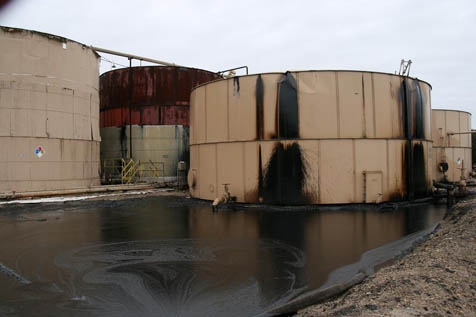Greka Cries Eco-Terrorism, County Beefs Up Oil Regulations
Sabotage!

Looking to counter hours of damning testimony about their oil operations from county, state, and federal agencies at the Santa Barbara County Board of Supervisors meeting this week, a spokesperson for Greka Energy attributed a recent rash of large-scale spills to “intentional human conduct.” Referring to injection pump failures and subsequent alarm snafus at two separate Greka tanks on December 7 and January 5 that spilled tens of thousands of gallons of crude oil into creeks, Greka spokesperson Robert O’Brien testified on January 15 that an independent investigation indicates that “there is somebody at work here who is a vandal at best or an eco-terrorist or saboteur at worst.” The Board of Supervisors ultimately seemed to disregard O’Brien’s claims, however, by unanimously voting to strengthen the county’s petroleum ordinances and fire codes to place the full burden of clean-up costs on the companies themselves.
In a county staff report, Greka was charged with spilling some 336,000 gallons of crude oil in the past four years, perpetrating some 400 incidents requiring the response of County Fire’s Hazardous Materials crew, and violating the county’s air quality standards more than 300 times-all since Greka began operation in Santa Barbara County in 1999. Summed up by the county’s deputy executive officer Ron Cortez, “Greka is responsible for more oil releases in the county than all other operators combined.”
Greka-which owns more than 800 on-shore oil pumps in the county, though only 254 are currently active-responded with a 30-minute presentation that called the county report “skewed and misleading” and noted that since Greka owns a vast majority of the oil leases in the county, its share of infractions should be greater than the other oil operators. “When you look at violations per well-head, we are right in the middle of the pack-no better and no worse than most of the other operators,” O’Brien stated. “Greka has never been identified on the California Department of Fish and Game’s list of major spills : We are a responsible corporate citizen.”
O’Brien outlined a current investigation by former top-ranking FBI agent Tom Parker into the two most recent spills. According to O’Brien, testing of the failed injection pump and alarm system at the December 7 spill site in the hours leading up to the spill and in the days afterward showed the facility to be in proper working order, thus suggesting foul play. Furthermore, the discovery of opened hatches, stripped wires, over-pressured pipes, and a possibly vandalized drainage pipe at the spill site in the days surrounding also suggest foul play, O’Brien said. While Greka continues its investigation, the company has also turned the matter over to both the Sheriff’s Department and the FBI, O’Brien said. His story, however, was refuted by a former Greka employee who testified during public comment that he had been at the first spill site just three days prior to the spill and noted the holding tank to be in peril of failing. “They knew all about it and didn’t do anything to fix it,” the former employee said. “Greka is a cancer that needs to be cured.”
Despite urgings otherwise from oil proponents, the supervisors voted to have staff explore five specific ordinances, including a multiple-response ordinance aimed at recouping county costs for spills, inspections, and cleanup; a centralized database to track violations reported by various local, state, and federal agencies; a high-risk offender ordinance, designed to protect county and landowners from absorbing clean-up costs should an operator be shut down or terminate a lease; and a staff report to the supervisors every 60 days on Greka’s compliance efforts.
Additionally, and perhaps most importantly, supervisors directed staff to better define who must enforce these ordinance changes and the various petroleum codes adopted this past summer when the codes are up for final approval in the coming weeks. As 2nd District Supervisor Janet Wolf put it, “We can have ordinances and new chapters. That’s fine. But unless we expend the resources for enforcement, nothing is going to happen.”



